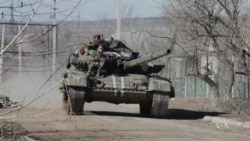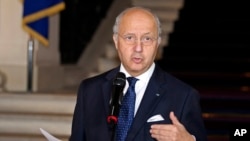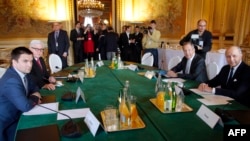Moscow would face more EU sanctions if pro-Russia separatists attacked Ukraine's government-held port of Mariupol, French Foreign Minister Laurent Fabius said on Wednesday.
“The problem today is particularly around Mariupol. We've told the Russians clearly that if there was a separatist attack in the direction of Mariupol things would be drastically altered, including in terms of sanctions,” Fabius told France Info radio.
“At a European level the question of sanctions would be asked again,” said Fabius, who hosted on Tuesday a meeting with his Russian, Ukrainian and German counterparts in which they renewed calls for an oft-breached ceasefire agreement to be respected.
Kyiv fears Mariupol, with its 500,000 people, could be the next major rebel target, its foreign minister Pavlo Klimkin said after the Paris talks.
Its capture could open a corridor to the south, including the already annexed Crimean peninsula.
Rebel commander Eduard Basurin said on Tuesday that the rebels still aimed to gain control of the entire territory of east Ukraine's two rebellious provinces, including Mariupol, but would seek this through “negotiations with the Ukrainian side.”
Basurin denied Kyiv's assertions that there were serious clashes in villages near Mariupol, saying there had been provocations from the Ukrainian side but no major incidents.
FM meetings sees little progress
A meeting of the foreign ministers of Russia, Ukraine, Germany and France ended Tuesday in disagreement over who is to blame for violations of the cease-fire in eastern Ukraine.
The diplomats met in Paris amid uncertainty that the cease-fire agreement, which was to have begun February 15 and requires the withdrawal of heavy weaponry from the front lines, will hold.
German Foreign Minister Frank-Walter Steinmeier said the talks were difficult. Ukrainian Foreign Minister Pavlo Klimkin said the ministers agreed on some "technical aspects," including support of a monitoring mission by the Organization for Security and Cooperation in Europe, but did not agree on who is to blame for breaking the cease-fire agreement.
Russian Foreign Minister Sergei Lavrov said the discussion was mainly focused on the implementation of the peace deal.
Speaking Tuesday before a U.S. Senate appropriations subcommittee, Secretary of State John Kerry said that Russia had repeatedly lied to him about its activities in Ukraine.
“Russia is engaged in a rather remarkable period of the most overt and extensive propaganda exercise that I've seen since the very height of the Cold War,” he said. “They have been persisting in their misrepresentations — lies, whatever you want to call them — about their activities there to my face, to the face of others on many different occasions.”
Kerry also said that talks were taking place within the U.S. administration on whether to supply Ukraine with defensive lethal weapons, but that he would keep his views private for the time being.
British Prime Minister David Cameron said Tuesday that failure to challenge Russia on Ukraine would result in the destabilization of Moldova and the Baltic States. Speaking before a parliamentary committee, Cameron said Britain would deploy military personnel to Ukraine in the next month to help train the Ukrainian army.
In Washington, a U.S. military official said the Pentagon also will be deploying a small number of troops to Ukraine to provide combat medical training.
Also Tuesday, a NATO military official said “the actions of pro-Russian separatists in Debaltseve following the latest cease-fire agreement have made it very difficult for anyone to trust their pronouncements.”
Russia has also continued to secretly provide support to separatists while publicly calling for peace, said the official, who added that what matters now are actions.
A second, nonmilitary official of NATO said Russia had provided over 1,000 pieces of equipment, including tanks, rocket launchers and air defense systems, to the separatists.
NATO continues to call on all sides to respect the terms of the cease-fire agreed to in Minsk.
Rebels report pullback
Meanwhile, rebels in eastern Ukraine said they had begun pulling back heavy weapons from the front lines, as required by the cease-fire.
Top rebel commander Eduard Basurin said the withdrawal began at 9 a.m. local time Tuesday. The move could not be independently confirmed.
Ukrainian military officials have not responded, but they had insisted that they would not pull weapons off the front lines as long as the fighting continued.
The fighting has killed more than 5,600 people in the last 10 months.
Under the peace deal reached this month in Minsk, both Ukrainian troops and Russian-supported rebel forces are supposed to withdraw their heavy weapons — pulling them back between 25 and 70 kilometers — to create a buffer zone in eastern Ukraine.
The Organization for Security and Cooperation in Europe (OSCE), which is monitoring the truce, was expected to brief the U.N. Security Council Tuesday at 3 p.m. EST (2000 GMT).
Gazprom warning
Hours ahead of the foreign ministers' meeting in Paris, Russia's state-owned gas giant Gazprom said it could cut off gas deliveries to Ukraine within days and also warned of a disruption of supplies to the rest of Europe.
Gazprom said in a statement that Ukraine's alleged failure to make a prepayment in time "will in two days lead to a complete termination of the Russian gas supplies to Ukraine, which creates serious risks for the gas transit to Europe."
Europe gets about a third of its gas from Russia. Around half of it flows through Ukraine. A gas cutoff could threaten supplies to Europe, although that is not a primary concern now, according to a spokesperson for the European Commission.
Gazprom halted supplies to Ukraine for six months beginning in June because of unpaid bills, a move that followed the ouster of Ukraine's Russia-friendly leader and the Kremlin's annexation of Crimea.
Last week, Gazprom began supplying gas directly to the parts of eastern Ukraine held by the Moscow-backed separatists.
Plea for peacekeepers
In New York on Monday, Ukraine's foreign minister pleaded with the 15-member U.N. Security Council to send peacekeepers to eastern Ukraine. He also accused Russia-backed rebels of ongoing attacks elsewhere in the east, and accused "militants and their Russian masters" of blocking European monitors from policing the withdrawal of heavy weaponry from front-line positions.
Appearing on Russian state television late Monday, President Vladimir Putin downplayed chances of war between Russia and Ukraine. Nobody needs an armed conflict, Putin told his interviewer, especially not one on the periphery of Europe.
The EU has steadily tightened sanctions against Russia, most recently last week. Visiting Estonia on Monday, British Foreign Secretary Philip Hammond expressed skepticism about Russia's will to abide by the Minsk deal.
"I have to say, from experience over the last 10 or 12 days, the Russian engagement in the Minsk process looks rather cynical. [It] looks like an agreement on paper which has immediately been broken on the ground," he said.
Lisa Bryant in Paris and Jeff Seldin contributed to this report. Some information for this report came from Reuters.








